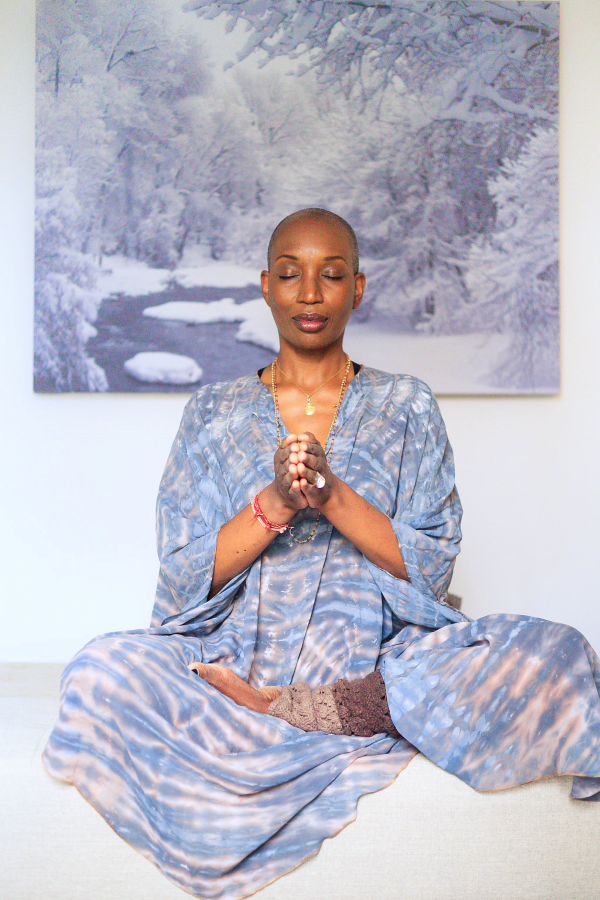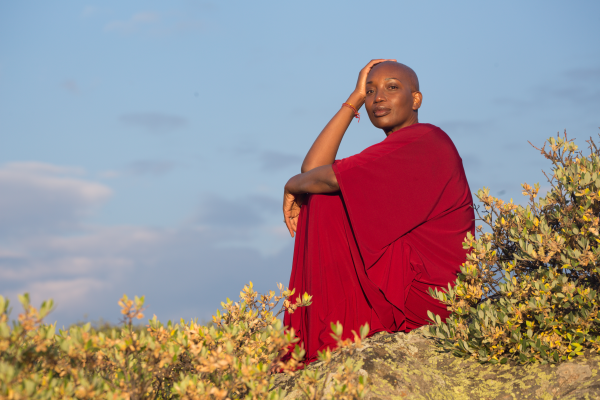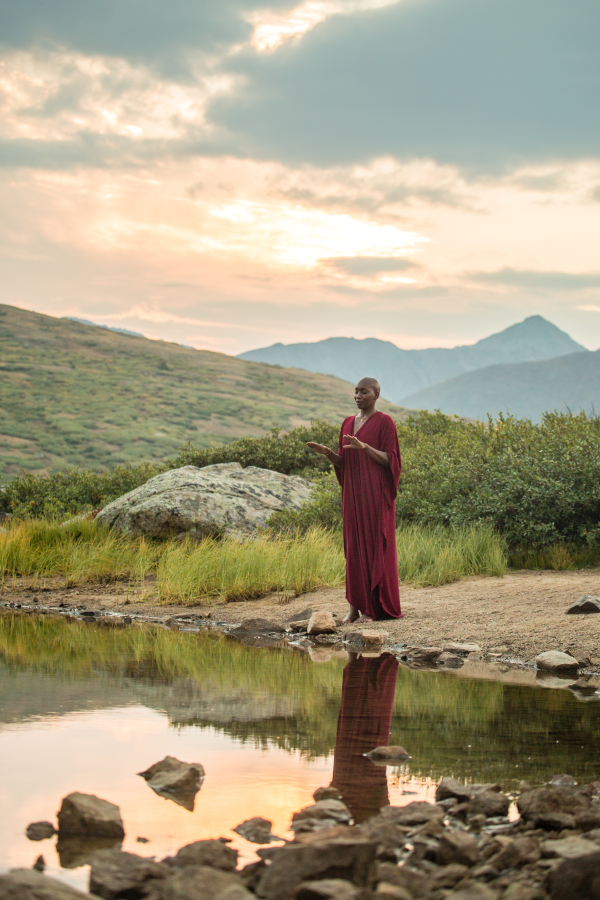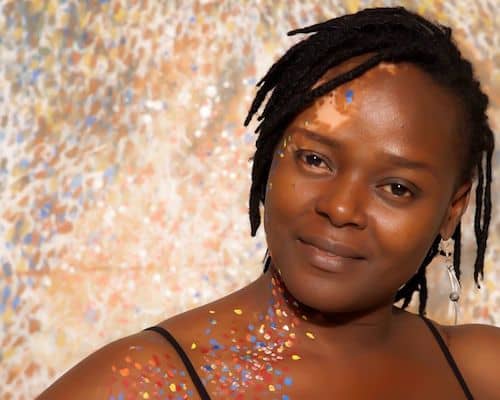Tracee Stanley On the Path To Finding Deep Rest in a Chaotic World
Tracee Stanley shares her journey to deep relaxation and discovering the radiant glow that resides in each one of us.
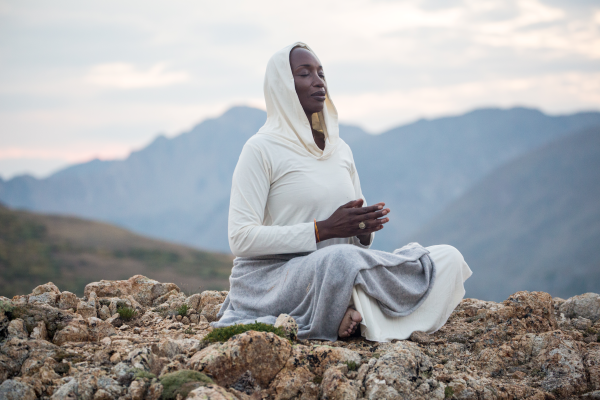
This article was first published in Radiant No. 16, The Self-Care Issue as Tracee Stanley: Lighting the Way Toward Rest.
We’re probably not getting the rest we need. According to the Centers for Disease Control and Prevention (CDC), adults ages 18 and over need seven or more hours of sleep per night for optimal health and well-being. Yet approximately 45.8% of Black adults regularly sleep less than seven hours each night. These same adults are more likely to report a lack of physical activity, obesity, excessive alcohol use, and cigarette addiction—all health risk factors that increase the likelihood of heart disease, cancer, and serious complications from COVID-19.
For those of us who do manage to sleep regularly, are we getting enough rest? Do we allow ourselves a moment to close our eyes, find a quiet space, and give our senses a rest? Do we give ourselves a chance to be free from the feelings of others? Do we take a moment to quiet our minds and create space between our thoughts? Do we give our bodies a break by simply doing nothing? If not, why aren’t we?
Tracee Stanley understands how to make things happen in Hollywood. Her ability to execute script development, casting, financing, and project budget administration elevated her from intern to head of a multimillion-dollar production firm in less than a decade’s time. As a nearly 20-year veteran of the movie industry, she’s worked with a who’s who list of headlining actors including Bruce Willis, Samuel L. Jackson, Jennifer Lopez, and Forest Whitaker. She’s also been a driving force behind the production of more than 160 major motion pictures which grossed a combined total of $330 million worldwide.
While navigating the topsy-turvy world of the motion picture industry, Tracee used the centuries-old practice of yoga nidra to identify and correct her unhealthy relationship with rest. A yoga practitioner of 25 years, the sought-after teacher offers guidance in self-realization through yoga nidra, meditation, and intention. Radiant spent an illuminating hour chatting with Tracee to learn more about her journey, the enormous value of relaxation, and the epic glow that resides in each one of us.
The Calm Found in Chaos
Tracee Stanley’s journey into the practice of yoga nidra began as a sneak preview of sorts. She’d been a fashion model living in post-apartheid South Africa when one early morning found her sitting alone on her balcony, awaiting the sunrise. Then “it” happened—that rare but familiar encounter with something wondrous that seems to stop time.
“I felt like I had answers to all these questions I’d been asking,” she described, as we eased into our conversation. Her voice was easy but her words were spoken with resolve. “I also had this sense that I was supported unconditionally by some unseen force. It seemed like it lasted forever, but I know that it lasted maybe a couple of minutes.”
Though Tracee’s roommates had side-eyed her when she told them about it, she could not shake what she’d felt. After asking around, she was steered toward books on spirituality, awakenings, and meditation. The more she learned, the more she noticed an internal shift, an awareness, a calm.
If we work into the wee hours of the night and forgo rest, we’re regarded as heroes who are truly committed to the task. But if we miss an event or an opportunity, then we are accused of having “slept on it.” Even our ability to recognize systemic injustice is described as being “woke.”
During a subsequent trip to Cape Town, Tracee’s belongings, including her modeling portfolio, were stolen. The thief had taken everything she possessed at the time except a single shoe and her copy of Nelson Mandela’s Long Walk to Freedom—which also contained her airline ticket and passport.
Tracee didn’t freak out; she viewed the theft as a confirmation. She’d wanted to exchange modeling for filmmaking anyway. Two weeks later, back home in the United States, Tracee began an internship with a startup film production company.
“I started to practice yoga, and I loved what I was feeling. It was very similar to being in the complete stillness of that moment that I was on the balcony in South Africa.” She stuck with the practice as she learned more about filmmaking and worked her way up in the company.
“I kept noticing that people would get very upset or feel very chaotic in the film business. I felt that yoga was actually giving me something extra so I could be calm in the midst of everything that was going on. It gave me perspective as to how to solve problems without getting caught up in all the drama.”
What It Means to Relax
“It was pretty much unheard of to have a Black woman as a top executive at a film company in the early 2000s,” Tracee recounted. “I would be the first one in and the last one out. I was running the company and I was the only person in the office who had not taken a vacation. Meanwhile, [other] people were going to the South of France and all of these fancy places.”
She accrued seven years of unused vacation time. I gasped, but I understood. Rest and proving one’s worth rarely mix.
“I always had to prove myself 200% more than everybody else. I knew there were people who were also coming after my job. At some point in practicing yoga, I started to recognize the power of the shavasana.”
Shavasana is the corpse pose, in which one lies face up with the legs comfortably spread and the arms slightly away from the body. This restorative pose is designed to refresh and reinvigorate the mind, body, and spirit while decreasing stress and tension at the end of a yoga session.
Tracee’s connection with the effects of shavasana convinced her to finally take some time off to attend a yoga retreat and learn more about the practice. In preparation for her vacation, she absentmindedly chose a publication of Patanjali’s Yoga Sutras, an authoritative guide of 196 aphorisms on achieving wisdom and purpose through the practice of yoga.
“As Black women, we really have to investigate what it means to relax.”
Tracee arrived at Sutra 1.36, on “the sorrowless and luminous state of the mind.”
“It talks about this radiance, this light that lives in the heart center and is beyond all sorrow. It is a place that was there before any of us had a name, and it is a place that will be there when we no longer have a body. It’s an infinite reservoir of light unaffected by any condition, any environment. Essentially a part of the yoga journey is to touch this place. This place is our core frequency, and we can always come back here to rest when things get tough.”
Related Articles
Something in this idea warmed and resonated within her.
“When I am relaxed and practice deep relaxation, I get more done because I have clarity and access to more power.”
During Tracee’s last executive production position, she experienced a revealing encounter with the production company’s owner. He asked her, “Why aren’t you juggling a bunch of plates and running around like a chicken with your head cut off, like everyone else in the office?”
This struck Tracee as odd. Why would anyone want to be an environment where pandemonium was somehow a reasonable barometer of progress. She wanted to be purposeful and at ease within a state of joyful, focused determination.
“As Black women, we really have to investigate what it means to relax.”
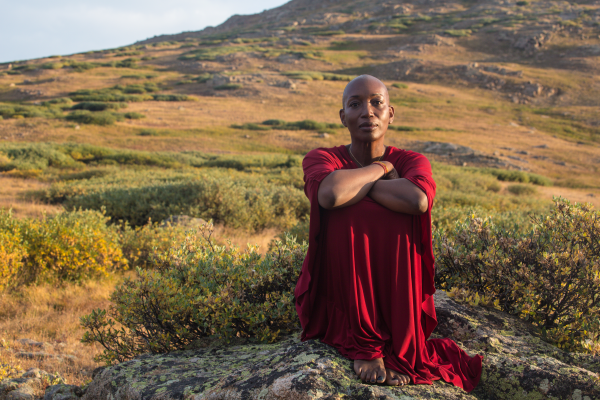
Tracee Stanley On The Myth of Laziness
It’s curious how we have come to negatively regard sleep and rest.
“I never sleep because sleep is the cousin of death” and “I’ll sleep when I’m dead” are boasts of strength and endurance. But taking a nap suggests indolence. If we work into the wee hours of the night and forgo rest, we’re regarded as heroes who are truly committed to the task. But if we miss an event or an opportunity, then we are accused of having “slept on it.” Even our ability to recognize systemic injustice is described as being “woke.”
I like sleep. I need sleep. We all do. Operating without sleep does not feel good, does not produce good results, and is harmful. Yet I know I’ve been guilty of chiding myself for being tired, and I’m not alone. Tracee reminded me of the reason why.
We have all this history of being beaten. Our lives could be in danger if we took a moment to have the rest we needed. It literally hasn’t been safe to rest while being in a Black body. We have this trauma in our DNA and it has been passed down generationally. But yoga can be the process of unraveling that lie and really connecting yourself back to the truth of who you really are.
By 1914, 90% of Africa’s land mass had been colonized by European powers who believed that Africa’s non-monetary economy and its variations in technological advances were the cause of its poverty-stricken conditions. Also, Africans were viewed as racially inferior, beastlike, and slovenly. This “lazy backward African” myth was incredibly useful in fueling the rationalization of forced labor in the name of economic progress. The colonized African was seen as the favorable, advanced African.
Meanwhile in the West, the stereotypes of “Sambo,” “Jim Crow,” and “the Savage” were equally pervasive. Blacks were believed to be naturally docile, slow-witted, lazy, and completely dependent upon masters for proper guidance. If not for a master, whites feared that Black people would spend every waking moment eating watermelon, singing, dancing, acting a fool, or being violent. This characterization served to defend slavery and torture as the just and proper way to give Blacks a sense of purpose and righteousness.
Over time, people of African descent internalized these farces.
“We have all this history of being beaten. Our lives could be in danger if we took a moment to have the rest we needed. It literally hasn’t been safe to rest while being in a Black body,” Tracee explained. “We have this trauma in our DNA and it has been passed down generationally. But yoga can be the process of unraveling that lie and really connecting yourself back to the truth of who you really are.”
Tracee Stanley On The Practice of Radiant Rest
“There’s a calmness of yoga that is about self-realization, liberation, spiritual freedom,” Tracee told me. “The kind of yoga I was doing was not that kind of yoga, and I needed to find a teacher who could lead me to that kind of yoga.”
At the time, Tracee was practicing power yoga and wanted to know if there was something more that she was missing, considering her epiphany on the corpse pose. She asked around the yoga community until she was connected to a lineage of yoga teachers and began to learn about yoga nidra, a teaching dating back thousands of years, passed from teacher to teacher.
“These teachings are tried and true, time-tested, with real power or shakti behind them.” Shakti is the force, power, energy, or ability that is believed to move through the entire universe. It is íke, simba, iko, awooda, nguvu, amandla, mphamvu, matla. It is the strength that dwells within us all.
“The practice of yoga nidra is a practice of dissolution, or being able to rest so deeply that it feels as though the body itself, the mind itself, is dissolving. The mind and body fall asleep and we are aware of that wise, powerful, radiant part of ourselves. That most ancient part that is able to commune with the ancestors.”
In order to be powerful, you have to be rested. Your mind has to be rested. Your body has to be rested. You have to be able to release some of the hurt. You have to be able to release these ebbs and flows that we’ve been going through and observe them, acknowledge them, and let them go.
As Tracee’s studies focused more on the true essence of yoga, breath, mantra, and meditation, her practice became less about performing a handstand and more about becoming still.
“In this stillness, you connect to your deep reservoir of power and wisdom. Nidra translates loosely to ‘sleep,’ but also ni means ‘void’ and dra means ‘to draw forth.’”
Tracee explained the four states of consciousness: waking, dreaming, deep sleep, and the place of no thought.
“It’s a place of fullness and emptiness at the same time. When Black people practice this, we see where our resistance is living and the ways in which we have been made to feel unsafe—all the ways in which we’ve been told we’re lazy. This practice can help us realize these traumas from our ancestors and from the modern day.”
Yoga nidra’s techniques, like diaphragmatic breathing, are very simple and can offer relief from depression, anxiety, insomnia, irritable bowel syndrome, high blood pressure, post-traumatic stress disorder, and tachycardia or fast heart rate.
“In order to be powerful, you have to be rested. Your mind has to be rested. Your body has to be rested. You have to be able to release some of the hurt. You have to be able to release these ebbs and flows that we’ve been going through and observe them, acknowledge them, and let them go.”
This Light of Mine
The wonderful thing about any transformative practice is its ability to serve all areas of an individual’s life. A sports player may take her lesson on team building into the office, while an artist may seize upon her knowledge of symbolism to promote peace among opposing factions. Yoga nidra provides support off the mat too.
“When you emerge from the practice, you are changed,” said Tracee, a smile in her voice. “There is definitely a healing that is occurring. You have a connection to your own core frequency, and you start to look for those connections when you’re not in the practice. Those connections appear in the form of lucid dreaming, reduced stress and anxiety, and increased quality of life.”
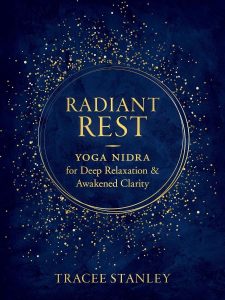
Throughout her search for personal peace, Tracee was able to see how seeking intention in her practice made a huge difference in her ability to weather any kind of storm. She imagined what could happen if more people made connections to their own inner light, and she wrote her book Radiant Rest with that purpose in mind.
“It’s a handbook for everyone who is interested in the deep relaxation and resting of yoga nidra and being able to practice every day. It’s for people who don’t like yoga; you’re lying down. I recognize that we all have jobs, kids, homes, and responsibilities, so the book features ways to practice throughout the day as well as longer practices whenever you can do them.”
Tracee also produces and hosts the Radiant Rest podcast, which offers insight into awakening to our true selves through deep sleep, rest, and dreaming. Past episodes have featured guests such as fellow yoga instructor Lama Rod Owens, lucid dreaming teacher Charlie Morley, psychologist Dr. Gail Parker, and Tricia Hersey of the Nap Ministry.
“This is the practice we should all be doing right now. We need to be ready for everything that is coming. We need to be rested. And we need to be clear.”
Radiant Rest is available on Amazon and independent bookstores. Learn more at RadiantRest.com.

